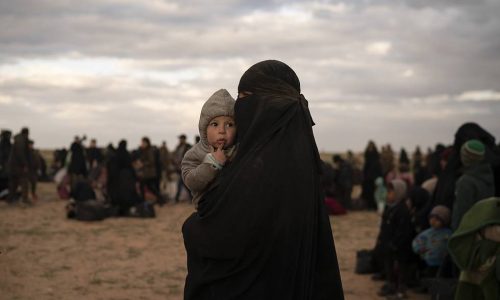
Bosnia and Herzegovina nervously awaits Islamic State women and children’s return
Senija Muhamedagic from Cazin in north-west Bosnia and Herzegovina is waiting for her daughter to finally come home.
Two years ago, Muhamedagic’s daughter, a former acolyte of the so-called Islamic State, escaped from an area controlled by the Islamist militant group. But she did not manage to get back to Bosnia and Herzegovina and is currently in a camp in Syria run by Kurdish and US forces.
She and two other Bosnian citizens sent a letter to the authorities more than six months ago, saying that they want to return to Bosnia and Herzegovina.
Muhamedagic’s daughter, who she did not want to name, said in the letter that she wants to come back with her children, that she regrets her decision to join a terrorist organisation in the Middle East, and that she is ready to face trial.
But the authorities have yet to find a way to bring her and dozens of other women and children back from the camps where they now live.
“We thought it would develop faster as far as our Ministry of Security and all that is concerned, but to this day, nothing has happened here,” Senija Muhamedagic told BIRN
She insisted that her daughter was aware that she had made bad decisions.
“Of course it took a lot of courage to write something, repent and ask for help,” she said.
Six months after the US authorities declared the fall of the so-called Islamic State, more than 100 men, women and children originally from Bosnia and Herzegovina are in camps in Syria.
The Sarajevo authorities face several major challenges – how to confirm the identities of Syrian-born children of Bosnian citizens, how to care for the former ISIS followers when they get back to Bosnia and Herzegovina, and – one of the most sensitive questions – whether to prosecute the women who are returning.
For months, humanitarian organisations have been warning states to speed up the process of bringing back their citizens, former residents of the so-called Islamic State, as living conditions in the camps have become increasingly poor, particularly for children.
The al-Hol Camp in north-eastern Syria currently houses more than 70,000 people, more than 90 per cent of whom are women and children.
The UN recently reported that around 390 children have died at al-Hol since the start of the year from treatable diseases. Senija Muhamedagic’s daughter and her four children are at the al-Roj camp, also in in north-eastern Syria, where conditions are somewhat better but still very difficult.
The authorities in Bosnia and Herzegovina have not yet officially announced when they expect the return of the women and children from the so-called Islamic State. The Ministry of Security, which is managing the process, rejected multiple requests from BIRN for an interview.
However, BIRN’s journalists were told in a number of unofficial conversations that the return of the women and children had been expected this summer. Institutions at the local level confirmed that their arrival is expected soon and that they are making rapid preparations. Among the returnees, according to experts, will be about 30 women, 70 children and about ten men.
BIRN has learned that security agencies have information that some of the women from Bosnia and Herzegovina who are currently in Syria participated in the fighting, and some were members of the so-called Sharia police force, which was responsible for numerous crimes against civilian.
In Bosnia and Herzegovina, no indictment or warrant has been issued for any woman so far, but lawyers explained that it is possible that some women will be prosecuted, not only for terrorism, but also for endangering the safety of children who were taken to the frontline territory controlled by Islamic State.
Source: Balkan Insight





